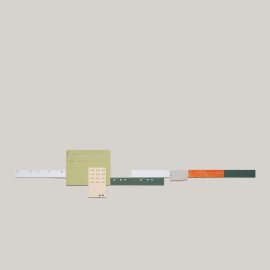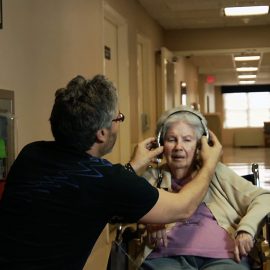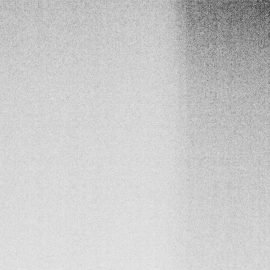This article is the third and final instalment in a three-part series, originally written by the composer, curator, and founder of the influential Australian experimental ambient label, Room40, Lawrence English in 2011, revised and updated in July of 2020. The guide is divided into three sections, and this one is subtitled “For You”. Be sure to check out the Introduction with an updated foreword, One tale of hustling, the first entry, “For The Work”, and the second, “For Others”, as well as a follow-up interview with the author discussing his unique view on the subject. This guide will also be available as a downloadable PDF at the conclusion of this feature on Headphone Commute. We hope you will enjoy, and more importantly, apply some of these lessons to help you in your quest!
The personal is political
Carol Hanisch’s statement of the relation between the self and the world remains one of the most inspiring, provocative and powerful statements of the 20th century. We all continue to learn a lot from feminism and the relevance of this positioning of the self continues to be profoundly effective. Our art is always better for interrogation into how it operates on minds and bodies, as well as within society and the political structures of the day.
Don’t take things for granted
Entitlement is banned, it’s that simple. It pays to remember, always, that not everyone is as fortunate and privileged as you or I might be. The playing field is not level and frankly, some of us aren’t even playing the same game. Keep questions of equity firmly in your mind.
As an Australian, I am blessed to live in a country where there are some good support systems and a fairly high standard of living. Australian artists are also fortunate to enjoy modest access to government funding, to have the opportunity to work with supportive galleries and venues (both public and private, from Artist Run Initiatives through to state galleries and museums) and we even have a handful of patrons for the arts.
Let’s be honest, we could always do with more support (and each of us should actively advocate and encourage for such growth), but we need to acknowledge that not everyone is in the same boat as us and we can’t just take these things for granted. These supports are points of leverage that we should use to assist those around us, as well as ourselves, be that through collaboration, commissioning or whatever else makes sense for you.
If you’re supported by a patron or awarded a grant, then try to make the most of it. Who knows what tomorrow brings – this is particularly the case for freelancers who exist project to project. After all, policies change, government interests shift and patrons can come and go. Each opportunity you have is something you should take hold of and remember that it may not always be this way.
On top of that, a personal recommendation – spread your risk. If you happen to operate entirely on government support, a patron or any kind of income from a single source, then keep in mind that support may not always be there. 2020 has demonstrated this with a relentless ferocity! The stability we may have known before can be eroded quickly and without remorse.
If you’re serious about sustaining your practice in the longer term, there’s nothing more important than having back up plans and income streams to see you through those difficult times. This might take the form of part-time work or a nest egg you build for yourself in the better years. It might also be thinking strategically to secure yourself a buffer of activity so you know where your meals are coming from for the next 6 or 12 months. Whatever works for you, your projects and your creativity. Just remember, nothing is forever and nor should it be. Change is a beautiful and chaotic thing, wild and exciting, don’t ever settle into a freelance stasis unless you want to decay.
You’ve got to have a line in the ocean to catch a fish
In the early 2000s, when I was supplementing my income with quite a bit of freelance writing, I had a curious interview with Gene Simmons from Kiss. Now, as you can imagine, sitting down with a self-described ‘high net worth individual’ could be cause for self-harm, but almost everything is a gift and it’s down to us to attempt to uncover whatever that might be.
Part way through the interview, which was meant to be about an upcoming tour, the conversation drifted into Simmons’ real passion – business. He said to me the one rule he lived by was “You’ve got to have a line in the ocean to catch a fish”. This comment is the only thing that I can recall from the interview, as it’s inherently relevant for any hustler.
If you’re not out there in the oceans of possibility casting your line, then it makes sense only very occasionally a fish might throw itself onto the deck of your boat. If you’re not visible, audible or in some other way available, how can people know about all the work you’re up to and how it might affect them for the better, or capture their interests, or connect with their projects? When we make work available it’s for others (yes, and us too) and the opportunity to share is one of the true pleasures of creating.
Now, this doesn’t mean you should rattle off your resume every time you meet someone (that’s tedious, truly it is, please don’t do that), but it does mean you should be present to the world, willing to listen to others and open to dialogue with those around you. It’s from those conversations that the most satisfying fish are glimpsed, shimmering at the water’s edge. Often, it’s not even a matter of having to reel the fish in, they come to you. I’m relatively sure Mr Simmons might disagree with me on this point, but I have no interest in being a high net worth individual and thus choose to operate differently in this world.
Without fear
This might sound obvious, but don’t be afraid to be you. Only you have experienced the challenges, surprises, hardships and rewards that your life has presented. This gives you a perspective unlike anyone of your peers. Sure, we feed on each other’s ideas, but as Jean-Luc Godard says, “it’s not where you take it from, it’s where you take it to”. Only you can transform and synthesise your feelings toward, and experiences of, the world and make them available for others to encounter and be affected by. That makes what you do special, so long as you are faithful to yourself.
It’s not always easy to ascribe a sense of worth to what we’re doing in any given moment. It can feel safer and easier to fall back on ground trodden by others, after all, there are often fewer decisions to be made in such circumstances, but there’s more to be gained from failure than familiarity. Be brave, failures are reminders we’re still alive and kicking.
Yes
‘Yes’ is an important word, especially when you are starting out. Even if a project isn’t exactly aligned with what you’re interested in, there are likely lessons and skills to be acquired from undertaking it. It pays to be open and interested. This is not to say agree to absolutely everything that pops up in front of you, more just to suggest there’s value in thinking about the scope of what a project might offer in the longer term, rather than the immediate outcomes that will result.
It’s also not to say that you should allow yourself to be exploited by someone trying to sell you on all the ‘added’ bonuses from a project that ultimately may not be treating you fairly. Almost always folks, promotion is not payment. Rather, it’s usually just the lower end of humanity taking too many capitalism pills each morning and being exploitative. For the most part, these are the people you need less to do with going forward into the world.
Essentially, the notion of ‘yes’ is about thinking strategically and trying to expand your view from the moment, to at least a little way down the line. Strategy is an exercise in focus over time. It’s not always easy, but it is always useful.
I can attest to the positive outcomes of this principle. For example, saying yes to a lecture on field recording has led me to commissions from museums, and agreeing to produce a show for an artist has led to new undertakings for similar projects in other settings, both for myself and the artist involved. It’s win-win! Also, it’s an ideal at the very heart of hustling.
No
There is always a counterpoint, however, and as you move through your creative life there will certainly come a point where saying yes to one thing means saying no to another, or in fact, one yes can mean a multiplicity of no.
In these moments, it’s good to have a methodology for why it is you choose to partake in one thing over another. For whatever it’s worth, I have found that choices based on pure economics are almost always wrong when agreeing to undertake work. Sure, sometimes precarity wins out, but when economics can be avoided as a primary driver for decision making, I recommend such a path.
Mental health in your everyday life is paramount in the short and the long term, and it’s the long game that is the focus of this text. Thinking along purely economic lines is particularly detrimental for maintaining satisfaction in work as you move forward through your life as a maker. Without a more considered approach to what makes for you saying yes or no, it’s very easy to become lost in the thickening fog of late capitalism.
Remember why you started
It sounds easy enough to do, but give yourself the better part of a decade in the throes and woes of the freelance arts and music environment and you’d be amazed how opaque your earliest memories become. It’s easy to lose track of why it was you first got started.
Over time, your reasons for doing what you do may ultimately change, but it always pays to remember what sparked you to commence this voyage. The reasons that made you take the leap of faith into unchartered waters might seem naïve, perhaps even irrational, but there’s a kernel of truth in that first thought, that when returned to reveals something new each time you consider it.
As circumstances change, that reason remains anchored in a time and place that offers you a chance to consider where you’ve come from, where you thought you might go and whether or not you’ve come close to that place you imagined. It’s a way of navigating experience. There’s a certain beauty to the shadows that accumulate as you walk forward through this life. Perspective can be difficult to get and little things like this can be vital in giving you context and understanding for what it is you’re doing now and why.
Think laterally
I’ve rarely found that a project presents itself in an entirely complete (or for that matter, financially achievable) state. This is where our hustle becomes most pronounced – how to cover the shortfall between aspiration and available resources?
How do we find the right partners to support particular aspects of a project? More often than not, finding answers to these problems won’t be a singular exercise. It’s going to require strategy and thinking outside your familiar orbits. This is especially the case as your projects grow in scale and complexity. The community of people and institutions you build around your work is something that needs attention and due consideration. While it may not always be possible, I always advocate for taking the time to find partners who share your curatorial and creative interests. Having that synergy is beneficial beyond words.
It pays to think about these things ahead of time too. It’s these partnerships and working relationships that can really dig you out of difficult holes. Building diverse contacts with community, organisations, patrons or funding sources that you can call on from time to time is a must for longer term survival, especially if your work involves championing and supporting other artists.
It’s important to recognise the potentials and limitations of these partners and to be respectful of their needs. A force fit is in no one’s interest, ever. Equally, no one partner should ever be ‘milked’ – that’s a short-‐term fix and always ends with someone feeling they’ve been done wrong by. You must extend the kind of respect to them you’d expect yourself.
Think globally
I dearly love Australia because it is a joyously small place and let’s face it, that’s one of its charms. It’s the kind of place where we all generally know (of) each other and people we don’t know are only a few degrees separated. This is a blessing and, for some, a curse. If you need help it’s never too far away, but if by chance your work/ideas don’t gel with the current state of play here, things can feel constrictive.
Don’t fret though, geographic boundaries are not respected by art, even less by ideas. There are always opportunities to be found or grown in other places, with other likeminded folks. I feel incredibly fortunate to have built up strong ties in all manner of places and these connections have resulted in some of the most enjoyable and satisfying moments of my life in art.
When we’re starting out, the world can seem a bit distant, but a little research online, a few emails and who knows what might reach back out of the virtual darkness. I guess that goes back to what old Gene was talking about.
It’s also worth considering how what we do fits into a wider ecosystem. We can often find ourselves a little crushed by local confrontations or disagreements that may weigh down on our mental health more than they should. In these moments, it’s vital to remember there’s a much larger world out there and what we do often fits into that frame just as much as it does within our given locality, if not more. It’s in these difficult moments we should remember there are folks out there who share our interests, our concerns, our desires and preoccupations all across the globe, and they too are fighting the good fight.
Feed yourself
I’m not just talking about physical intake for your bodily health here, but also food for your mind. Time swiftly disappears when you’re freelancing – it’s a DIY world and you can bet no matter how hard you beg, the admin fairies won’t do those budgets for you or reply to the cascade of emails spilling into your inbox.
It can be difficult to commit time to explore new art, music, film or writing, and that’s where trouble can start. There’s nothing more important for the mind than being challenged, stimulated and excited by the intellect of others, by novel ideas and through new creative pursuits.
I’m not saying you have to go to every opening or event in town, on the contrary, sometimes interests outside your area of work will be most useful for sparking fresh positions and approaches. Don’t forget that there’s a whole world out there for the exploring – a world rich in possible inspirations and curiosities, don’t be afraid to make time to explore the world.
Have a companion (or companion animal) and a life
Seems obvious to say this, but seriously, this is a must. If you’re not in a position to have a close companion, have friends or family you can rely on. As important as this work feels (and is), there’s more to life than this. Sometimes you can feel quite crushed and disheartened after a rough month or two and it’s those close to you, those who love you for who you are (and perhaps for what you do too) that can offer you a chance to recuperate and refocus during periods of stormy weather.
It’s at these times, a pat on the back from a loved one, the warm glow of a dog or cat on your lap or a nice walk somewhere green with a friend, can offer you a chance to reflect on something bigger than your woes. Always remember that there’s more to your life than that project which won’t get up or the opportunity that just keeps eluding you.
Moreover, it’s all the experiences that happen outside your practice that actually help shape it. Like your general health, creativity relies on a good and varied diet, too much of one thing is never really a good option in the long term.
And finally love what you do…
I mean it. Art, music, film, theatre, dance, literature and the list goes on – the best work is always driven by passion. It is what carries you through the troughs and allows you to enjoy the highs.
If you lose that, it’s ok, maybe it’ll come back and maybe it won’t. The thing is, be aware of that feeling, and don’t lie to yourself about it, that only catches up with you down the line. If you do lose your passion for a spell, there’ll no doubt be other options open to you – other ways that you might facilitate or foster great work being produced. Loving what it is you’re doing and who you are doing it with makes things that much more worthwhile and satisfying.
As useful and reassuring as money can be, it doesn’t ever satisfy like passion does. As I mentioned before there’s nothing more difficult than having to create and deliver a project, which you’re not actually passionate about.
If you are passionate about a project and it doesn’t turn out the way you’d hoped, well it’s never that much of a problem. You believed in it, had a great time realising it, working with people you care about and want to see do well. If it does work out, then that satisfaction is only amplified. Do yourself a favour and be true to yourself and create work and opportunities you care about!
Download a PDF version of this guide from Bandcamp.







